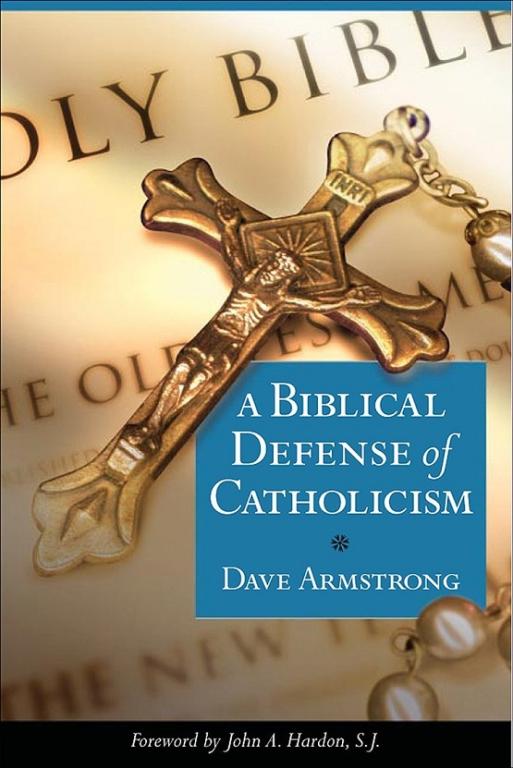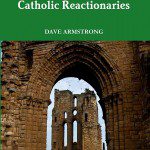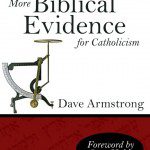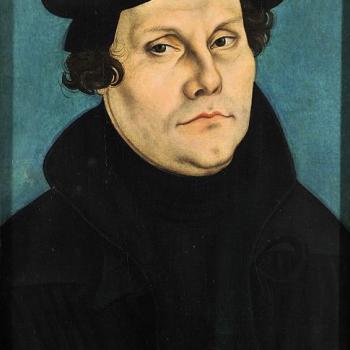[297 pages; completed in May 1996. Published in October 2001 by AuthorHouse and in June 2003 by Sophia Institute Press; cover illustration and design by Theodore Schluenderfritz]
—– To purchase, go to the bottom of the page —–
Table of Contents
[you can read the hyper-linked portions below online, as sample material. The Sophia Institute edition is slightly different]Dedication
Acknowledgements
Foreword: Fr. John A. Hardon, S.J [read below]
Introduction [read below]
1. Bible and Tradition: Maintain the Traditions . . .
2. Justification: Faith Apart From Works is Barren
3. Development of Doctrine: He Will Teach You . . .
4. The Eucharist: This is My Body
5. The Sacrifice of the Mass: A Lamb . . . Slain
6. The Communion of Saints: All Who Are In Christ
7. Purgatory: . . . Saved, But Only As Through Fire [most of chapter posted online]
8. Penance: . . . Share Christ’s Sufferings
9. The Blessed Virgin Mary: Hail, Full of Grace
10. The Papacy and Infallibility: Keys of the Kingdom
Appendix 1: The “Perspicuity” (Clearness) of Scripture [read online]
Appendix 2: The Visible, Hierarchical, Apostolic Church
Appendix 3: The Historical Case for the “Apocrypha”
Appendix 4: The Biblical Basis for Clerical Celibacy
Appendix 5: A Dialogue on Infant Baptism [linked]
Appendix 6: A Dialogue on Liturgy and “Vain Worship” [read online]Recommended Catholic Apologetic and Historical Works
Index of Scriptures [e-book versions only]
Index of Proper Names [e-book versions only]
Foreword
*
Fr. John A. Hardon, S.J.
Please allow me to introduce to you Dave Armstrong. I know Dave and his wife Judy personally. I received him into the Church on February 8, 1991, and baptized both their children, Paul and Michael. Dave has attended my classes on spirituality and catechetics. He was formerly a missionary as an evangelical Protestant, and has spent twelve years in intensive study of various theological topics. He carries this evangelistic zeal with him into the Catholic Church.
In particular, I highly recommend his work, A Biblical Defense of Catholicism, which I find to be thoroughly orthodox, well-written, and effective for the purpose of making Catholic truth more understandable and accessible to the public at large. Dave has edited and compiled much material from great Catholic writers past and present, interspersed with his own commentary and analysis. It is, I firmly believe, a fine book of popular Catholic apologetics.
Throughout his writing, Dave has emphasized the inability of Protestantism to explain coherently the biblical and historical data concerning Christian doctrine and practice. I feel this is very important in light of the inroads of Protestant thought into the hearts and minds of millions of insufficiently catechized Catholics.
In Our Lord,
John A. Hardon, S.J.
September 17, 1993
Introduction
During the course of 1990 I was actively and sincerely engaged in a lengthy historical and biblical critique of Catholicism (primarily having to do with papal infallibility) as a result of the ongoing dialogue taking place in an Ecumenical Discussion Group which I had initiated. I thought that I might entice my Catholic friends out from under the alleged “yoke” of Rome. Little did I know that before the year was over, I would be the one to change my mind!
With heartfelt joy and a keen sense of discovery, I now attempt to uphold that which I formerly attacked, and to critique many of the evangelical Protestant interpretations of Scripture which I strongly affirmed not long ago. Formerly, as an evangelical countercult and campus missionary, I was committed to the defense of mere, or generic Christianity. Now I seek to defend that Faith which might be called Ancient or Historic.
The present work endeavors to show that Catholicism can more than hold its own with regard to the evidence of the Bible, as it relates to distinctive doctrines which are considered unbiblical or even anti-biblical by many evangelical Protestants. Our separated brethren often contend that Catholics (to understate it) are very unfamiliar with the Bible. This is, sadly, probably true as a general observation (although biblical illiteracy is certainly not confined to Catholics).
Nevertheless, it has no bearing on the question of whether the Bible in fact upholds the teachings of Catholicism. Many Catholic biblical arguments and interesting exegetical conclusions are entirely unfamiliar to most Protestants (and for that matter, most Catholics as well).
I myself learned of the vast majority of these scriptural evidences in favor of Catholicism while engaged in the research for this book, which was itself originally intended as a defense of my newfound views, primarily for the sake of Protestant friends who were curious as to the rationale behind my conversion to Catholicism. The more I studied Catholic apologetic works (many of which were older books obtained at used bookstores), the more I realized what a wealth of biblical material existed in favor of Catholic positions on a number of “controversial” doctrines.
I was continually amazed at the depth and solidity of these arguments, and pleasantly surprised that the Bible, which I had loved and studied intensely for ten years, could so confidently be utilized as a bulwark in defense of the Catholic faith. Catholicism, rightly understood, is – I believe strongly – an eminently and thoroughly biblical belief system.
This was entirely contrary to what I had so cavalierly assumed, as an evangelical Protestant. Reputable Protestant commentaries often ignore, overlook, or present very unsatisfactory explanations for Catholic biblical evidences, sometimes offering no more than an unsubstantiated denial of the Catholic interpretation, with no alternative.
The weight of the evidence herein presented is all the more compelling, I think, by virtue of its cumulative effect, which is well-nigh overwhelming. Time and time again, I discovered that Catholicism is altogether consistent with biblical teaching. Many claim that distinctive Catholic beliefs are simply not found in Scripture. Often, however, those who present this charge have little or no understanding of the notion of the development of doctrine, implicit biblical evidence, or the complementary (and biblically-based) roles of Tradition and the Church. All of these factors and other related ones will be examined in this work.
Catholics need only to show the harmony of a doctrine with Holy Scripture. It is not our view that every tenet of the Christian faith must appear whole, explicit, and often, in the pages of the Bible. We also acknowledge Sacred Tradition, the authority of the Church, and the development of understanding of essentially unchanging Christian truths, as is to be expected with a living organism (the Body of Christ) guided by the Holy Spirit. A belief implicitly biblical is not necessarily anti-biblical or unbiblical. But we maintain that the Protestant principle of sola Scriptura, on the other hand, is incoherent and – I dare say – quite unbiblical.
In fact, many doctrines accepted by Protestants are either not found in the Bible at all (for example, sola Scriptura and the Canon of Scripture), are based on only a very few direct passages (for example, the Virgin Birth), or are indirectly deduced from many implicit passages (for example, the Trinity, the Two Natures of Jesus, many attributes of God such as His omnipresence and omniscience).
I have no formal theological training (although I have done a great deal of independent study over the last twenty years). This work is intended primarily as a layman’s observations for other laymen, without pretending to be anything beyond that. C. S. Lewis, the great Anglican Christian apologist (and my favorite author) often made a similar claim for his own writings. He was formally educated in English literature, not theology. To my knowledge, neither G. K. Chesterton nor Malcolm Muggeridge had any formal theological education, either. They were journalists by trade, and self-definition. Yet they – along with Lewis – are among the most celebrated Christian apologists of the twentieth century.
Furthermore, my relative lack of credentials might actually be somewhat of an advantage on my part, from the vantage point of Protestant assumptions about the perspicuity, or “clearness” of the Bible (in terms of its outlines of the means whereby a man can be saved). Martin Luther made a famous remark to the effect that even a “plowboy” could interpret Scripture in the main without the necessary help of the Church. This is, then, largely, a Catholic “plowboy’s” attempt to learn and to share from Scripture itself (although without in the least denying the authoritativeness of the Church and Tradition).
I am always wholeheartedly willing to interact with scholars and reflective and thoughtful non-scholars who hold opposing viewpoints. If, however, even superior theological education cannot suffice for an adequate, reasonable alternate explanation over against the Catholic interpretations of various portions of Scripture presented herein, then it seems to me that this would serve only to strengthen the case I have made as an ordinary layman.
The widespread existence of evangelical Protestant Commentaries and various Lexicons, Bible Dictionaries, Concordances and so forth, for the use of laypeople, is based on a presupposition that individuals without formal theological education can arrive at conclusions on their own. This is largely what I am attempting presently. The only difference is that I am willing to modify or relinquish any conclusions of mine which turn out to be contrary to the clear teachings and dogmas of the Catholic Church, whereas the quintessential Protestant ultimately can stand on his own (like Luther), “on the Bible,” against, if need be, the whole Tradition of the Christian Church. I formulate my conclusions based on the work of Church Councils, great Catholic scholars, Fathers, Doctors, and saints, just as the conscientious Protestant would consult the scholars and great pastors and theologians of his own persuasion.
Far from having to force the Scripture to conform to Catholic teaching, or to equivocate, or to rationalize away glaring contradictions, I’ve found that – invariably and delightfully – the converse is true: Catholicism is indeed the round peg, so to speak, that naturally fits into the round hole of Scripture. I have not undergone any torments of conscience or “intellectual suicide” in this endeavor, and I am more confident than ever that the Catholic Church is the “Bible Church” par excellence.
This discovery will never cease being wondrous and marvelous to me (as well as to many other fellow converts to the Catholic Church via evangelical Protestantism). For it means that we can continue to be evangelical in every proper and true sense of that word: to love and cherish the Scriptures, to follow Jesus with all our heart, soul, strength, and mind, and to proclaim the message found in the Bible in its fullness and apostolic integrity, unmingled with the error of excessively individualistic interpretation, and competing, contradicting denominational beliefs. Accordingly, this work cites hundreds of Scriptural passages from 229 out of the 259 chapters in the New Testament (88%), and more than 250 Old Testament references.
Catholicism is not a blind faith, but rather, one that is altogether reasonable, as far as reason goes (without excluding at all the essential religious characteristics of mystery, miracle, supernatural revelation, and love). A Catholic need not forsake hermeneutical rigor or critical acumen in any way.
Catholics can, assuredly, learn much from many positive and godly attributes of evangelicalism and Protestantism in general. Likewise, a Protestant can derive much benefit from Catholicism, whether he feels compelled to convert or not. The non-Catholic can – after grappling with facts and arguments such as those presented herein – eventually recognize that Catholics are able to put forth a very strong biblical case for their beliefs. Likewise, the average Catholic in the pew, who oftentimes suffers from a marked lack of spiritual confidence, can greatly benefit from an increased familiarity with the biblical arguments which bolster the Catholic position.
Each chapter will contain an authoritative definition and relatively brief exposition of the Catholic doctrine to be defended, followed by extensive scriptural commentary on individual passages. Footnotes will direct the reader who wishes to pursue issues in greater depth to other relevant works, and reinforce the arguments from scholarly sources, but will not interrupt the flow of the writing – intended to be popular and relatively non-technical in style.
It is not my intention to minimize the importance of Tradition, Councils, papal pronouncements, and suchlike, at all. Rather, I seek to exhibit as many of the biblical evidences as can be brought to bear on any particular distinctively Catholic doctrine (at least all that I’ve personally found – certainly more exist). Doctrines held in common with Protestants and Eastern Orthodox Christians, such as the Trinity, Bodily Resurrection of Christ, heaven and hell, and so forth, are not here dealt with.
All Christians agree that it is worthwhile to study and meditate upon the Bible – God’s own inspired Revelation for all mankind. Non-Catholics and even non-Christians might receive here some biblical food for thought, even if they are unconvinced by my arguments. It is a worthwhile endeavor to build bridges of understanding between Christians of all stripes, as commanded in Scripture. If this work causes the reader to delve more deeply into Holy Scripture, or various Catholic sources, or to think more critically and deeply about the biblical evidences for various Protestant and Catholic doctrines, then it will have fulfilled its purpose.
Book Reviews
Interview with Peter Vere, JCL: 12 November 2001.Donal Anthony Foley (on the Theotokos Catholic Website: January 2002).Bookideas.com website: review by John Hoh (Lutheran).Anonymous review on my blog (from a Protestant considering Catholicism).Michael J. Miller, in Homiletic & Pastoral Review, May 2004.Albert, at the Christian Book Reviews site (traditional Anglican)R.E. Aguirre, at the Ex Umbris Et Imaginibus In Veritatem blog (April 2008).Radio Interviews About the Book
Purchase Options
Last revised on 18 March 2023
***

















